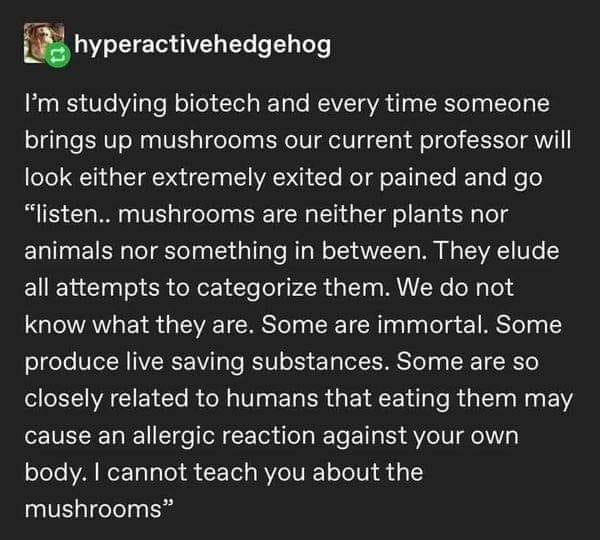this post was submitted on 17 Mar 2024
1036 points (97.1% liked)
Science Memes
11426 readers
1862 users here now
Welcome to c/science_memes @ Mander.xyz!
A place for majestic STEMLORD peacocking, as well as memes about the realities of working in a lab.

Rules
- Don't throw mud. Behave like an intellectual and remember the human.
- Keep it rooted (on topic).
- No spam.
- Infographics welcome, get schooled.
This is a science community. We use the Dawkins definition of meme.
Research Committee
Other Mander Communities
Science and Research
Biology and Life Sciences
- [email protected]
- [email protected]
- [email protected]
- [email protected]
- [email protected]
- [email protected]
- [email protected]
- [email protected]
- [email protected]
- [email protected]
- [email protected]
- [email protected]
- [email protected]
- [email protected]
- [email protected]
- [email protected]
- [email protected]
- [email protected]
- [email protected]
- [email protected]
- [email protected]
- [email protected]
- [email protected]
- [email protected]
- !reptiles and [email protected]
Physical Sciences
- [email protected]
- [email protected]
- [email protected]
- [email protected]
- [email protected]
- [email protected]
- [email protected]
- [email protected]
- [email protected]
Humanities and Social Sciences
Practical and Applied Sciences
- !exercise-and [email protected]
- [email protected]
- !self [email protected]
- [email protected]
- [email protected]
- [email protected]
Memes
Miscellaneous
founded 2 years ago
MODERATORS
you are viewing a single comment's thread
view the rest of the comments
view the rest of the comments

Honestly, I'm not a mycologist, so someone with more expertise feel free to correct me, but I'm pretty sure that's BS.
The concept of a mushroom being generally similar to humans is total horseshit. What they're probably referencing is a mushroom with some signaling protein (or saccride or steroid or something) that is coincidentally similar some human equivalent and your immune system (for some reason) freaks out about it when you eat it. Then, as is referenced, the response to the mushroom happens to also be able to target some of your own cells, and now you've got an autoimmune disorder.
That behavior is not normal for your immune system to do, by the way, otherwise cannibals would all die from allergic reactions to their unfortunate meals. But, the immune system is complicated, so shit happens sometimes.
There are fungal infections that cannot be treated as there are no good targets for fungicides that don't also affect humans
I mean, yeah, but that's on the level of "because they're eucaryote" like us and all plants and animals, as opposed to bacteria which are procaryote. It's not really some freakish similarities.